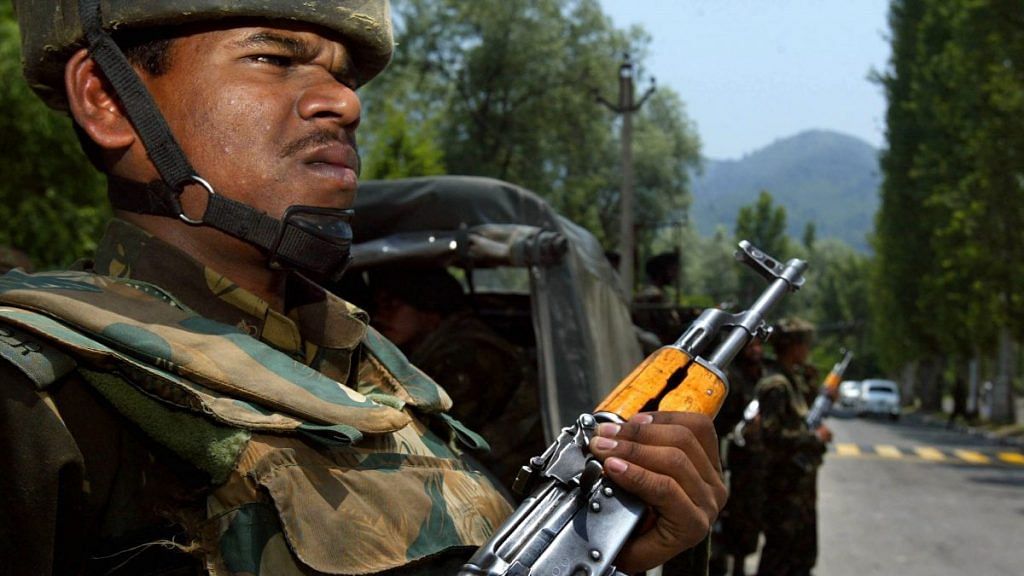The AFSPA, which was meant to provide protection to soldiers, is now insufficient.
The fact that 356 serving personnel of the Indian Army have approached the Supreme Court seeking protection from dilution of the Armed Forces (Special Powers) Act shows that a large section of the serving personnel is demoralised and angry. The ire is directed at the senior leadership of the Army, the Supreme Court and politicians.
On 8 July 2016, a two-judge bench of the Supreme Court delivered its judgment on a writ petition filed in 2012 by the Extra Judicial Execution Victim Families Association (EEFAMA) of Manipur. The judgment followed several other cases that dealt primarily with allegations of illegal killing of innocents by the police and the armed forces in Jammu and Kashmir, the northeast, and in the Naxal areas.
The writing on the legal wall was obvious – the judiciary had entered the combat space. And AFSPA, which was meant to provide protection, is now insufficient. However, this does not in any way imply that no investigation should be carried out. Rather, the soldier may no longer have the protection from allegations that are vexatious in character.
Also read: Army officers are asked about AFSPA in tests, they know its gravity
The downstream effect of the July 2016 judgment is the court-monitored investigation by the CBI into allegations of extra-judicial killings in Manipur. The narrative, therefore, is that the Supreme Court has unleashed the CBI on the Indian Army and if it is presently confined to Manipur, it could be applied in Jammu and Kashmir in due course.
It is not important if the narrative is true or false, but that the political and military leadership should be gravely conscious of what may imperil the fighting capacity of the Army through demoralisation. Soldiers may internalise the fear of being hauled up before investigating agencies and courts for acts done as part of their duty and in good faith.
Take the case of the veterans. Any veteran who receives a notice to appear before an investigating authority is forced to hire a lawyer and could thereafter be subjected to a painfully slow and lengthy process that disrupts his life. He is also psychologically subjected to a fear of punishment for an act carried out on the orders of a superior.
Serving personnel could harbour a similar fear and what’s worse is that it could impact the execution of their duties if they do not enjoy the assurance of protection for acts done in good faith. One needs to understand the psychological effect of the enlarged judicial cloud in the combat space and its adverse impact on their morale. No Army can afford to weaken the morale, which is the final arbiter of the fighting capability of a soldier.
The government’s approach so far has been to argue about the interpretation of the existing legal framework – the Code of Criminal Procedure, the IPC, the AFSPA, the Army Act. This approach is fundamentally flawed because the Supreme Court is merely interpreting and applying the law in the context of its constitutional position. The matter has to be approached strategically because it impinges on the efficacy of a prime instrument of the state – the military.
The strategic approach would be to safeguard the innocent soldier from a prolonged investigative process while also upholding the human rights of the victims. Certainly, it cannot be left for the courts to find the balance. The onus of deciding this sensitive and critical issue lies at the door of the government and Parliament because it is in their purview to uphold the sovereignty and integrity of India.
On 26 July 2018, Parliament enacted The Prevention of Corruption (Amendment) Act. One of the amendments is seeking prior approval of the concerned authority for initiating investigation into corruption cases against certain public servants, where the said offence relates to any recommendation made or decision taken by the public servant while discharging his official function or duties. The decision of the concerned authority has to be conveyed within three months, which may be extended for another month. The only exception to this prior approval is a scenario wherein public servants are caught red-handed. This protection is also extended to retired personnel.
If civil servants can enjoy such immunity in the name of protecting the innocent, there is no reason why a similar protection cannot be afforded to serving and retired soldiers. The government must, therefore, issue an ordinance to provide similar protection to all soldiers and follow up with relevant amendments in the AFSPA.
The Army’s efforts should be perceived as seeking the cover of the law and not from the law. It is not beyond the realm of possibility that aggrieved veterans could launch protests. It must not be allowed to happen.
Also read: 356 Army men go to court to keep AFSPA
The act of a collective group of officers, JCOs and other ranks who are mostly infantryman serving in operational units, petitioning the highest court is a palpable reflection of their loss of faith in the Army’s senior leadership and the government. In a moral sense, this is a revolt.
India’s geopolitical situation is crying out for a sharpened and relevant military instrument at a time when it is besotted by a host of issues regarding lack of political guidance, acquisition and equipping, civil-military relations, defence budget, inter alia.
The issue under discussion pertains to the spirit of the soldier, which cannot be allowed to wilt. An ordinance that protects the soldier yet keeps the door open for the possibility of investigation in particular cases is the need of the hour.
Lt Gen (Dr) Prakash Menon, PVSM, AVSM, VSM, is director of strategic studies programme at the Takshashila Institution, Bengaluru, and former military adviser, National Security Council Secretariat.
